Publications : Doctrine
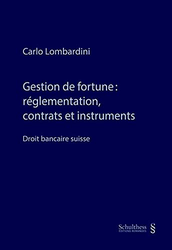
►Référence complète : Lombardini, C., Gestion de fortune : réglementation, contrats et instruments, Scholtherss Éditions Romandes, Genève, 2021, 416 p.
____
► Présentation de l'ouvrage en 4ième de couverture :
L'ouvrage examine l'évolution du droit suisse de la gestion de fortune depuis la crise de 2008.
L'auteur expose et analyse, dans une perspective non seulement théorique, mais également pratique, les règles applicables aux relations entre les clients et les prestataires de services financiers, les rapports contractuels qui se nouent et l'exécution des prestations qui en découle. L'ouvrage présente également le fonctionnement de divers instruments financiers et les risques liés à leur utilisation. L'approche est principalement fondée sur le droit suisse, en particulier sur le cadre proposé par la Loi sur les services financiers (LSFin) et la Loi sur les établissements financiers (LEFin), tout en les comparant avec le droit de l'Union européenne.
Thesaurus : Doctrine

► Référence complète : A.-C. Rouaud, "L’intensité de l’Obligation de Vigilance selon les secteurs : le cas des opérateurs financiers", in M.-A. Frison-Roche (dir.), L'obligation de Compliance, Journal of Regulation & Compliance (JoRC) et Dalloz, coll. "Régulations & Compliance", 2024, à paraître
____
📕lire une présentation générale de l'ouvrage, L'obligation de Compliance, dans lequel cet article est publié
____
► Résumé de l'article (fait par le Journal of Regulation & Compliance - JoRC) : L'auteure développe le cas des opérateurs financiers et montre que si ceux-ci sont soumis à des très lourdes obligations de vigilance, c'est avant tout en raison des risques systémiques des marchés, obligations consubstantielles à leurs activités, car ces opérateurs étant souvent en charge des infrastructures de marché ou opérant des prestations, qui les font tous appartenir à la catégorie des professions réglementées.
Malgré cette unicité, la manifestation de l'obligation de vigilance est protéiforme, allant de la police, de la surveillance du client, à sa mise en garde, sa protection, laquelle peut être très réduite, la lutte contre le blanchiment visant à protéger le système (kyc).
Cette obligation de vigilance poursuit des finalités variables, ce qui explique des sanctions diverses, car l'intensité de l'obligation varie aussi. La lutte contre le risque systémique est certes une finalité commune, mais s'y ajoutent des soucis de protéger des catégories, par exemple d'investisseurs (perspective plus européenne).
L'intérêt général est pourtant aujourd'hui renouvelé car, constitué par la protection des marchés, il se double du souci de durabilité.
Cela se traduit par une variabilité des sanctions, allant des sanctions disciplinaires, maniées par l'Autorité des marchés financiers (AMF), l'obligation de mettre en place des programmes de compliance par rapport auxquels les manquements sont sanctionnés per se.
Le private enforcement se développe en articulation avec le public enforcement, avec une transformation du risque contentieux pour les entreprises, très sensible à l'extraterritorialité et à la portée du Droit souple.
________
Jan. 17, 2024
Thesaurus : Doctrine

► Référence complète : E. Moyne, "Les impacts sur les droits de la défense des disparités de la justice pénale négociée dans l’Union européenne", in M.-A. Frison-Roche et M. Boissavy (dir.), Compliance et droits de la défense. Enquête interne – CJIP – CRPC, Journal of Regulation & Compliance (JoRC) et Dalloz, coll. "Régulations & Compliance", à paraître.
____
📕consulter une présentation générale de l'ouvrage, Compliance et droits de la défense - Enquête interne, CIIP, CRPC, dans lequel cet article est publié
____
► Résumé de l'article (fait par le Journal of Regulation & Compliance - JoRC) : L'auteur examine tout d'abord dans l'espace européen l'usage que le Droit français fait de ces techniques de justice négociée. Il constate leur extension continuelle, notamment de la CJIPP qui, de réforme en réforme, s'étend désormais à la fraude fiscale et aux délits environnementaux, estimant qu'il faudrait que cela puisse fonctionne à tout et à tous, c'est-à-dire d'une part à toutes les infractions, notamment en droit de la concurrence et à toutes les infractions financières, et d'autre part non seulement aux personnes morales mais encore aux personnes physiques.
L'espace européen est pour l'instant plutôt occupé par le Parquet européen, dont l'action pourrait être efficace pour mener à une transaction pénale ou à une CJ, notamment en matière environnementale. Pour l'instant l'hétérogénéité des procédures simplifiées à la disposition des différents procureurs européens délégués en matière de poursuite engendre un risque de forum shopping. En outre, l'absence d'harmonisation européenne des mécanismes de transaction pénale ou de CJIP rend difficile la mise en oeuvre de ceux-ci car non seulement de nombreux Etats-membres ne les ont pas même institués mais lorsque cela est le cas, les procédures sont très diverses, notamment concernant les droits de la défense...
____
🦉Cet article est accessible en texte intégral pour les personnes inscrites aux enseignements de la Professeure Marie-Anne Frison-Roche
________
June 6, 2023
Newsletter MAFR - Law, Compliance, Regulation
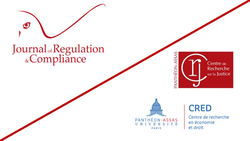
♾️suivre Marie-Anne Frison-Roche sur LinkedIn
♾️s'abonner à la Newsletter MAFR Regulation, Compliance, Law
____
► Référence complète : M.-A. Frison-Roche, "Compliance : obligation, devoir, pouvoir, culture (colloque 13 et 14 juin 2023)", Newsletter MAFR Law, Compliance, Regulation, 6 juin 2023.
____
📧Lire par abonnement gratuit d'autres news de la Newsletter MAFR - Law, Compliance, Regulation
____
🔴 Comprendre l'Obligation de Compliance afin d'en maîtriser la pratique (colloque des 13 et 14 juin 2023 du Journal of Regulation & Compliance (JoRC), du Centre de recherche sur la justice et le règlement des conflits (CRJ) et du Centre de recherche en économie et droit (CRED) de l'Université Paris Panthéon-Assas).
La compliance parait inmaîtrisable dans sa diversité et son ampleur et l'on doute parfois de sa juridicité.
Pour favoriser la maîtrise de cette pratique et construire le Droit de la Compliance, il est essentiel de mieux cerner l'Obligation de compliance.
C'est l'objet de ce colloque.
____
📧lire l'article ⤵️
March 15, 2023
Thesaurus : Doctrine
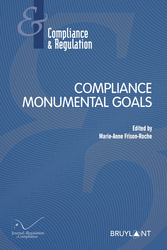
► Full Reference: S. Lochmann, "ESG Rating Agencies and Compliance as an Effective Way of Increasing International Competitiveness", in M.-A. Frison-Roche (ed.), Compliance Monumental Goals, coll. "Compliance & Regulation", Journal of Regulation & Compliance (JoRC) and Bruylant, 2023, p. 389-400.
____
📘read a general presentation of the book, Compliance Monumental Goals, in which this article is published.
____
► Summary of the article:
________
Sept. 1, 2022
Thesaurus : Doctrine

► Full Reference: S. Lochmann, "Les agences de notation ESG et l'effectivité de la compliance face à la compétitivité internationale" ("ESG Rating Agencies and Compliance as an effective way of increasing international competitiveness"), in M.-A. Frison-Roche (ed.), Les Buts Monumentaux de la Compliance, coll. "Régulations & Compliance", Journal of Regulation & Compliance (JoRC) and Dalloz, 2022, p. 401-412.
____
📕read a general presentation of the book, Les Buts Monumentaux de la Compliance, in which this article is published
____
► Summary of the article (done by the Journal of Regulation & Compliance): The purpose of this article is to show that the markets, those who provide them with financing and those who draw on them, need information on the environmental, social and governance dimensions of the companies involved, ESG rating agencies are companies that contribute to the overall performance of the system and converge on the Monumental Goals that drive Compliance Law.
From this perspective, and taking Moody's as a concrete example, the article first explains the role played by an ESG rating agency and its evaluation methodology, in particular the criteria used and the way in which companies inform the markets and stakeholders in this area, particularly with regard to climate change, converging in this respect with the public authorities and with the various international texts, treaties and texts of soft law that follow one another.
This convergence between the activity of ESG rating agencies and Compliance Law in that it is organised normatively around Monumental Goals is particularly marked in the organisation of a "just transition", with the agency's activity being inserted into the construction of European texts. It thus appears that the ESG investment ecosystem is in full evolution, implying full collaboration between all participants in the financing industry for sustainable financing and, ultimately, the permanence of democracy.
________
Sept. 1, 2022
Thesaurus : Doctrine

► Full Reference: A.-V. Le Fur, "Intérêt et raison d’être de l’entreprise : quelle articulation avec les buts monumentaux de la compliance ?" ("Interest and “raison d’être” of the company: how do they fit with the Compliance Monumental Goals?"), in M.-A. Frison-Roche (ed.), Les Buts Monumentaux de la Compliance, coll. "Régulations & Compliance", Journal of Regulation & Compliance (JoRC) and Dalloz, p. 55-67.
____
📕read a general presentation of the book, Les Buts Monumentaux de la Compliance, in which this article is published
____
► Summary of the article (done by the Author): Companies would have a soul. The legislator thinks so, since the French law called "loi Pacte" of 22 May 2019 obliges managers to act in the Corporate Interest and allows companies to formulate themselves a « raison d'être ». Compliance Law does the same, relying on companies to save the world from corruption, slavery, terrorism and global warming, thus achieving Monumental goals.
At first glance, the contours of Corporate Interest and « raison d’être » of the company are not far removed from the notion of Compliance Monumental Goals. This is not surprising, since the objective that presided over their introduction into the French Civil Code is the same as that underlying Compliance Law : to rethink the place of the company in the global Society, by affirming long-term values or concerns. This is a reason to use these corporate law concepts in the context of an X-ray of the concept of Monumental Goals.
However, a comparative approach is disappointing. The divergences between corporate notions and compliance lead to the conclusion that company law is not intended to impose anything other than a corporate public order. Notions that are more philosophical than legal, Corporate Interest and « raison d'être » are assigned functions that limit their scope. The imperative nature of corporate rules, and this is a consequence of the above, cannot be compared with that of compliance: uncertain, it is also relative when compared with the "violence" of compliance rules. The impact of the notions of Interest and « raison d'être » remains thus mainly internal to the company.
According to a second approach, it cannot be ruled out that Corporate Interest and « raison d'être » allow for a better understanding of higher and universal values by Company Law. Corporate Interest may incorporate Compliance Monumental Goals while the « raison d'être » may constitute a perspective for the realization of these goals.
The stakes are high : when the interest of the company, as a legal person and autonomous economic agent, joins the Monumental Goals, the means of achieving the latter are multiplied by internalizing them in all companies, not just the largest ones. However, despite all good intentions, a company is only governable if the compass does not become an elusive and indecisive vane; in other words, if legal certainty is respected. This is why a legal ordering of the concepts is necessary, which ultimately leads to a suggestion of their domain, content and scope.
________
Sept. 1, 2022
Thesaurus : Doctrine

► Full Reference: F. Marty, "L'apport des programmes de conformité à la compétitivité internationale : une perspective concurrentielle" ("The contribution of compliance programmes to international competitiveness: a competitive perspective"), in M.-A. Frison-Roche (ed.), Les Buts Monumentaux de la Compliance, coll. "Régulations & Compliance", Journal of Regulation & Compliance (JoRC) and Dalloz, 2022, p. 381-400.
____
📕read a general presentation of the book, Les Buts Monumentaux de la Compliance, in which this article is published
____
► Summary of the article (done by the Journal of Regulation & Compliance): The author analyzes economically the question of whether the compliance programs set up to respect competition rules are for the sole purpose of avoiding sanctions or also contribute to the goal of increasing the international economic performance of companies. which submit to them.
The author explains that companies integrate by duplication external standards to minimize the risk of sanctions, developing a "culture of compliance", which produces their competitiveness increase and the effectiveness of the legal and economic system. In addition, it reduces the cost of investment, which increases the attractiveness of the company.
In this, this presentation based on the postulate of the rationality of companies and investors, compliance programs can fall under self-regulation. The duplication of the law that they operate takes place largely according to "procedural" type methods.
________
June 16, 2022
Thesaurus : Doctrine
► Référence complète : Th. Saupin, "L’articulation entre le dispositif commun et les dispositifs sectoriels, l’exemple du droit bancaire et financier", in Fr. Drummond & J. Icard (dir.), Le nouveau cadre légal des lanceurs d’alerte, JCP E, n° 24, 16 juin 2022, étude 1216, pp. 35-39
____
► Résumé de l'article (fait par l'auteure) : "La loi du 21 mars 2022, qui transpose la directive Lanceurs d’alerte, est venue renforcer la protection du lanceur d’alerte, elle tente également de l’articuler avec les dispositifs sectoriels existant dans les domaines bancaires et financiers.".
____
🦉Cet article est accessible en texte intégral pour les personnes inscrites aux enseignements de la Professeure Marie-Anne Frison-Roche
_______
Jan. 26, 2022
Teachings : Droit de la régulation bancaire et financière - semestre 2022

► Résumé de la leçon n°1 de droit de la régulation bancaire et financière : La "Régulation" ne se confond pas avec la "réglementation". Elle constitue un "Droit" spécifique, dont la "réglementation" n'est qu'un outil, comme le sont les lois, les décisions de justice, etc., qu'ils prennent la forme d'actes obligatoires (hard Law) ou s'adressent simplement à ceux qui sont concernés (soft Law). La "Régulation" ne se confond pas davantage avec la "Supervision", avec laquelle elle se cumule souvent, comme ici en matière bancaire et financière. Ainsi, en-deçà des multiples Codes, par exemple le Code monétaire et financier, ce sont avant tout les Autorités de régulation et de supervision qui fabriquent et font vivre ce "Droit de la Régulation bancaire et financière", à travers non seulement textes et décisions, mais encore leur doctrine, souvent exprimée par des communiqués et lignes directrices, qui ont souvent plus d'impacts que les textes eux-mêmes.
Il convient donc de débuter par les institutions françaises : l'Autorité des marchés financiers (AMF) et l'Autorité de contrôle prudentiel et de résolution (ACPR).
Ces autorités sont elles-mêmes ancrées dans le système juridique français et ont des relations entre elles mais elles sont et entremaillées au niveau européen et s'insèrent en outre dans des relations internationales constantes. Il est impossible de les appréhender indépendamment de ces différents ancrages, notamment le système juridique français, lequel se déploie entre les deux ordres de juridictions, juridictions judiciaires et juridictions administratives, substantiellement unis autour des principes constitutionnels, et s'ancre dans l'ordre de l'Union européenne. Mais de fait, parce que la banque, et plus encore la finance, ne sont pas contenues dans les frontières des systèmes juridiques, le Droit américain, plus proche du Droit britannique (Common Law) que du Droit européen continental (Civil Law) dont la France et l'Allemagne demeurent l'expression, sont la source première d'influence.
Après avoir fixé quelques définitions et avoir rappelé le raisonnement privilégié en Droit de la Régulation, prenant l'AMF puis l'ACPR, la première partie de la leçon décrit de l'AMF, qui succéda à la COB, née en 1967 par copie de la SEC américaine, suppose que l'on expose son statut, sa composition, ses pouvoirs et les contrôles dont elle est l'objet. Cette description institutionnelle vise à faire comprendre ce à quoi cette institution sert, c'est-à-dire ses missions : cela correspond à la définition même du "Droit de la Régulation", branche du Droit téléologique, c'est-à-dire définie par ses finalité (ce qui n'est pas la façon classique de définir une branche du Droit). C'est en raison de sa finalité, à savoir la préservation de l'équité, la transparence et la liquidité des marchés financiers, ce qui lui permet de protéger l'épargne publique, que l'on comprend pourquoi l'AMF est consubstantiellement indépendante (règle de valeur constitutionnelle, sur laquelle nous aurons l'occasion de revenir).
De nombreux modèles institutionnels existent et on les expérimente les uns après les autres. Le secteur des banques et des assurances continue d'être régulé par une Autorité administrative adossée à la Banque de France, l'ACPR, dont il convient de faire une semblable description. L'on y voit une grande similarité institutionnelle, ce qui permet de mesurer ce qui fait la différence en Droit entre le secteur bancaire et le secteur financier.
____
🔎 Regarder les slides servant de base à la leçon n°1 relative aux institutions bancaires et financières de régulation et de supervision.
🔎 Revenir aux bases avec le Dictionnaire bilingue du Droit de la Régulation et de la Compliance.
🔎 Approfondir par la Bibliographie générale du Droit de la Régulation bancaire et financière
Utiliser ci-dessous les matériaux pour aller plus loin et préparer votre conférence de méthode⤵️.
Nov. 2, 2021
Thesaurus : Jurisprudence
Oct. 29, 2021
Thesaurus : Doctrine
► Référence complète : Maréchal, A., "Le Droit est un outil de compétitivité pour la place de Paris", entretien, Actu-Juridique, 29 octobre 2021.
____
______
March 30, 2021
Newsletter MAFR - Law, Compliance, Regulation

Full reference: Frison-Roche, M.-A., Why do we regulate? If it is to prevent systemic risks, systemic "family offices" must be subject to it (Archegos case) (Pourquoi régule-t-on? Si c'est pour prévenir les risques systémiques, les "family offices" systémiques doivent y être soumis (cas Archegos)), Newsletter MAFR - Law, Compliance, Regulation, 30th of March 2021
Read by freely subscribing other news of the Newsletter MAFR - Law, Compliance, Regulation
Summary of the news:
Archegos was a wealth management company whose activity consisted mainly in managing funds that were not themselves from the financial markets (hence its title of "family office"). Obviously, Archegos was proving to be too fragile financially in view of the highly speculative commitments it made on the financial markets and systemic banks were particularly deeply affected by the liquidation of large amounts by Archegos to be able to respond to margin calls.
As the mandate of the financial regulatory authorities is aimed almost exclusively at the protection of public savings, Archegos completely escaped the regulation and supervision of the Securities and Exchange Commission (SEC). However, Regulation Law also aims to prevent and manage systemic risks, which are often multi-sectoral and even trans-sectoral, and this in a teleological way. In view of this and the increasingly important place taken by speculative behavior in the financial markets, the financial regulatory authorities must give up the condition of using public savings in their consideration of operators which should be regulated because even an operator not handling public savings can threaten the existence of financial markets. From this perspective, "family offices", not handling public savings but having a systemic dimension, must come under the regulation and supervision of financial regulatory authorities.
March 10, 2021
Teachings : Banking and Financial Regulatory Law - Semester 2021

Résumé de la dernière leçon : La Compliance, ne serait-ce que par ce terme même, est un mécanisme nouveau dans les systèmes juridiques européens, venant notamment en convergence du Droit de la concurrence, du Droit financier et du Droit du commerce international. L'on considère généralement qu'il provient du Droit financier et du Droit américain, qui développe ainsi d'une façon extraterritoriale ses conceptions juridico-financières.
Est ainsi en train de naître un Droit de la Compliance.
Il pourrait être celui qui disciplinerait l'économie numérique, laquelle croise étroitement l'économie bancaire et financière, qu'elle renouvelle.
Pour en mesurer l'importance et le développement, qui ne font que commencer, le plus probant est de commencer par sa manifestation incontestable en Droit français, à savoir la loi du 9 décembre 2016 de la loi dite "Sapin 2", suivant de peu la loi du 21 juin 2016 sur les abus de marché et suivie de peu par la loi du 27 mars 2017 sur le devoir de vigilance des sociétés donneuses d'ordre.
Revenir aux bases avec le Dictionnaire bilingue du Droit de la Régulation et de la Compliance
Approfondir grâce à la Bibliographie générale du cours de Droit de la Régulation bancaire et financière
Revenir au plan général du cours de Droit de la Régulation bancaire et financière
Revenir à la présentation générale du cours de Droit de la Régulation bancaire et financière
Parcourir les billets quotidiens d'actualité sur la Compliance.
Utiliser les matériaux ci-dessous pour aller plus loin et préparer votre conférence de méthode:
March 3, 2021
Teachings : Banking and Financial Regulatory Law - Semester 2021

Résumé de la leçon. Dans son lien avec la gouvernance, le Droit de la régulation bancaire et financière a l'ambition d'organiser la façon dont les pouvoirs s'organisent au sein des entreprises, son prisme le conduisant à orienter cette gouvernance vers la protection de l'épargne, des investisseurs et des marchés. Imprégnant ainsi le Droit des sociétés, c'est contre cela que le rapport Notat-Senard a réagi, puis ce que la loi dite PACTE du 22 mai 2019 a cristallisé.
Il demeure que si la société est cotée, ce qui ne correspond pas à toutes les entreprises, le Droit de la régulation continue à influer cette gouvernance à travers le principe de transparence. Celui-ci accroit son emprise lorsqu'il y a une perspective de changement de contrôle. En effet les marchés financiers ne sont pas que des marchés de rendements pécuniaires : ils sont aussi des marchés de pouvoirs, ce qui renvoie à la double nature du titre de capital : son titulaire peut revendiquer des droits patrimoniaux (potentiels) mais aussi des droits politiques actifs, même s'ils n'emportent pas forcément pouvoir de décision.
Ce marché du pouvoir et du contrôle des sociétés est par excellence le marché boursier. Les prises de contrôle, qui pourraient en rester à la nature de contrats d'achat et de vente, sont entièrement gouvernées par l'Autorité de Régulation. L'on part donc du principe d'une offre, mais il peut arriver que cette offre d'achat (ou d'échange) devienne "obligatoire", lorsque des seuils de prise de contrôle sont déjà atteints. Même lorsque des textes interviennent dans un sens libéral, comme en ce qui concerne le contrôle des montants proposés par les offreurs dans le mécanismes d'OPA ou d'OPE les directives de l'Union européennes demandant à ce que les Régulateurs ne contrôlent plus le caractère "équitable" de celui-ci, les juges admettent que par le visa de l'office général du Régulateur et la bonne information de l'actionnaire un tel contrôle soit maintenu, voire accru (cas Altice).
Le marché financier pénètre déjà dans cette régulation des pouvoirs sociétaires lorsque la société est "exposée" au marché financier par la cotation de ses titres sociaux, ou par le mécanisme plus général de financement de marché, les investisseurs titulaires de titres de créance demandant le bénéfice de la même transparence, voire des droits politiques analogues à ceux dont bénéficient les titulaires des titres de capital. Mais les entreprises, à travers leur structuration sociétaire, sont définitivement "ouvertes" lorsque leur capital, c'est-à-dire non seulement leur richesse mais encore le pouvoir politique, est disponible sur ce marché financier spécifique qu'est le marché boursier. Le Droit régule alors les procédés de "prise de contrôle", tâche première de l'Autorité des marchés financiers, car si le pouvoir est par principe disponible, la "loi des volontés" ne peut suffire. L'on retrouve alors, mais sous une forme plus nette, les lois du capital, des volontés et des intentions.
Le Droit pose en effet le principe même des "offres publiques", les opérateurs devant tout d'abord révéler leur "intention" de prendre le contrôle, puis devant offrir à tout actionnaire une contrepartie soit en argent soit en titres. Dans cet achat du pouvoir, le Régulateur boursier joue un rôle central, mais les textes européens dans une perspective plus libérale que précédemment ont posé qu'il n'a pas à contrôler le caractère équitable du prix que l'initiative de l'offre propose, concentrant davantage son pouvoir sur l'information due aux personnes "intéressées", ce qui est excède le seul cercle des titulaires des titres de capital, pour concerner le cercle de la catégorie qui commence à s'implanter dans le nouveau Droit des sociétés qui se dessine : les "parties prenantes". Par la régulation des "prises de contrôle des sociétés ouvertes", l'on quitte de plus en plus l'idée d'une Régulation jouxtant l'économie administrée, parce qu'il s'agirait de la puissance étatique tenant les structures du marché financier afin que celui-ci soit fiable, le premier principe étant la transparence, pour aller vers une Régulation jouxtant la "Gouvernance" des sociétés qui sont exposées aux marchés financiers et qui à ce titre doivent admettre que leur fonctionnement politique doit être transparent, notamment au regard du futur de l'entreprise, voire partagé avec ceux qui ont un intérêt financier avec ce fonctionnement, voire avec également ceux qui y ont un intérêt non directement financier. En cela, le Droit de la Régulation des marchés financiers, en procéduralisant et en contrariant le fonctionnement trop brutal de ceux-ci, est le bastion avancé d'un fonctionnement plus général des sociétés, de nombreuses dispositions ayant tendance à être bilatéralisées dans le Droit des sociétés non-cotées, puisque cette distinction n'existe pas formellement par ailleurs dans le Droit des sociétés.
Revenir aux bases avec le Dictionnaire bilingue du Droit de la Régulation et de la Compliance
Revenir au plan général du cours de Droit de la Régulation bancaire et financière
Revenir à la présentation générale du cours de Droit de la Régulation bancaire et financière
Utiliser les matériaux ci-dessous pour aller plus loin et préparer votre conférence de méthode.
Dec. 1, 2020
Newsletter MAFR - Law, Compliance, Regulation
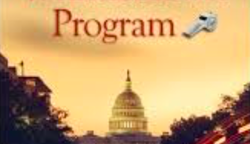
Full reference: Frison-Roche, M.-A., New SEC Report to Congress about Whistleblower Program: what is common between American and European conception, Newsletter MAFR - Law, Compliance, Regulation, 1st of December 2020
Read by freely subscribing other news of the Newsletter MAFR - Law, Compliance, Regulation
Summary of the news
Like every year since the adoption of the Dodd-Frank Act, the Securities and Exchanges Commission (SEC) and especially its Office of the Whistleblowers (OWB) handed to the Congress of the United-States a report about the success of its program concerning whistleblowers, especially estimated with the amount of financial rewards granted to them during the year. This report especially presents the amount granted to whistleblowers, the quality of the collected information and the efficacy of SEC's whistleblowers' protection process.
If Americans condition the effectiveness of whistleblowing to the remuneration of whistleblowers, Europeans oppose the "ethical whistleblower" who shares information for the love of Law to the "bounty hunter" uniquely motivated by financial reward and favor the former to the later, as it is proven in the French Law Sapin II of 2016 (which do not propose financial reward to whistleblowers) or the British Public Interest Disclosure of 1998 (which just propose a financial compensation of the whistleblower's losses linked to whistleblowing).
However, American and European conceptions are not so far from each other. As United-States, Europe has a real care for legal effectivity, even if, because of their different legal traditions, Americans favor effectivity of rights while European favor effectivity of Law. If it places effectivity at the center of its preoccupations, Europe should conceive with less aversion the possibility to financially incite whistleblowers. Moreover, United-States and Europe share the same common willingness to protect whistleblowers and if rewarding would enable a better protection, then Europe should not reject it, as shows the recent declarations of the French Defenders of Rights. It is not excluded that both systems converges in a close future.
Nov. 26, 2020
Publications
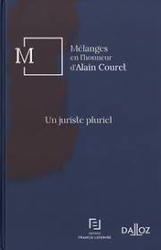
Full reference : Frison-Roche, M.A., Pour une conception humaniste du Droit des affaires et de son enseignement (For a humanist conception of Business Law and of its teaching), in Un juriste pluriel. Mélanges en l'honneur d'Alain Couret, Editions Francis Lefebvre and Dalloz, 2020, pp.985-990.
Read the article
Read the general presentation of the book in which this article has been published
Nov. 16, 2020
Thesaurus : Soft Law
Full reference: US Securities and Exchanges Commission, Whistleblower Program. 2020 Annual Report to Congress, 16th of November 2020
Read, to go further on the question of whistleblowers:
- Frison-Roche, M.-A., The impossible unicity of the legal category of whistleblowers, working paper, 2019
Oct. 9, 2020
Thesaurus : Soft Law
Full reference: Financial Stability Board, The Use of Supervisory and Regulatory Technology by Authorities and Regulated Institutions. Market Developments and Stability Implications, Report of 9th of October 2020, 36 p.
Read the presentation of the report by the Financial Stability Board
To go further on the question of the use of new technologies in regulatory processes, read Marie-Anne Frison-Roche's working paper: Analysis of blockchains with regards with the uses they can fulfill and the functions that the ministerial officers must ensure
Oct. 9, 2020
Thesaurus : Jurisprudence
Full reference: Tribunal judiciaire de Paris, 9th of October 2020, Ordonnance de référé, Veolia/Suez, N° RG 20/56077
Sept. 22, 2020
Newsletter MAFR - Law, Compliance, Regulation

Full reference: Frison-Roche, M.-A., Interregulation: way of "cooperation protocol" between Regulatory Bodies. Example between French Financial Markets Authority and Anticorruption Agency, Newsletter MAFR - Law, Compliance, Regulation, 22nd of September 2020
Read by freely subscribing other news of the Newsletter MAFR - Law, Compliance, Regulation
Summary of the news:
Although Regulation Law was born from the notion "sector", constant interferences between sectors and frequent interactions between some sectors and more general questions common to different sectors, make interregulation necessary. Compliance Law being the extension of Regulation Law, this interregulation mechanism is also necessary in Compliance Law.
This interregulation can take many legal paths like letters exchanges between regulators, the creation of a network of regulators and supervisors at the world level or about some specific question or the adoption of a "cooperation protocol" as the AMF (French Financial Market Regulator) and the AFA (French Anticorruption Agency) did on 16th of September 2020 to reinforce their respective fight against corruption, against market abuses and for the protection of investors.
This cooperation protocol between the AFA and the AMF has the following subjects:
- A more efficient methodology concerning the research and the analysis of corruption and market abuses.
- A more efficient prevention of corruption and market abuses.
- A better capacity to give recommendations of new regulations to the Legislator.
- A more rigorous monitoring of international works on the topic.
- A more coherent information for the public.
Are regulators the new teachers?
June 4, 2020
Thesaurus : Jurisprudence
Full reference: CA Paris, i7, Iliad, 4th of June 2020, n° 19/11454
May 28, 2020
Publications
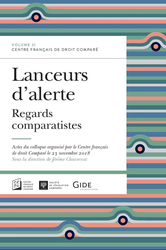
Full reference: Frison-Roche, M.-A., L'impossible unicité juridique de la catégorie des "lanceurs d'alertes" ("The impossible legal unicity of the category of "whistleblowers""), in Chacornac, J. (dir.), Lanceurs d'alertes, regards comparatistes, ("Whistleblowers, comparative perspectives"), Publications of the Centre français de droit comparé ("French Comparative Law Center"), May 2020, Volume 21, p.13-31.
Read the article (in French).
Read the general presentation of the collective book in which this article is published
Read the bilingual working paper which had served of basis for this article.
Read the presentation of the conference "Les lanceurs d'alertes: glose" (Whistleblowers: glose") and especially the slides elabored for the colloquium organized by the Centre français de droit comparé ("French Comparative Law Center") on 23th of November 2018 under the direction of Jérôme Chacornac
____
Introduction of the article
"Whistleblowers". This is a new expression. Which is a great success. Barely heard once, we hear it everywhere ...
A topic not of course or knowledge test, but rather a topic of daily conversation. Because it is spoken to us every day, in more or less gracious terms. For example President Donald Trump on October 1, 2019 declared to the press "want to question" the whistleblower who would have illegally denounced him and would not, according to him, have the right to conceal his identity, proof in this according to him of the lying character of his assertions against him, while his lawyer indicates on October 6, 2019 that he is not speaking on behalf of a single whistleblower thus taken to task but of a plurality of people who gave information against the President of the United States. Even the most imaginative screenwriters would not have written such brutal and rapid twists and turns. Spectators, we are waiting for the next episode, secretly hoping for the escalation.
And precisely if we go to the cinema, it is still a whistleblower whose dedication and success, we are told about, even the drama, for the benefit of global society, and in particular democracy, since the secrets are fought for the benefit of the truth. The Secret Man designates Mark Felt as the first whistleblower. Returning to what we often present as being a more "serious" media!footnote-1391, we listen to France-Culture and here is another story told by a historian who worked as an archivist on events that political power would have liked to keep hidden by possibly destroying their traces but which its trade led to preserve: here it is expressly presented to the studious listeners like a "whistleblower" .... While the same radio tries to find the one who could well be, as in a kind of contest the "first whistleblower"!footnote-1727? .... This rewriting of History can be defended because ultimately what did other Voltaire do for Calas, or Zola for Dreyfus?
It is also a subject of legislative discussion since in the United States the Dodd-Frank law of 2010 inserted in the law of 1934 which established the Securities & Exchanges Commission a complete device of remuneration and remuneration of the whistleblowers, whereas after having developed flexible but guiding lines in this regard in 2012!footnote-1698, the European Commission published on November 20, 2018 the text of what will become a Directive intended to give a unified European status to the character, in the system gradually developed to protect the one who was presented in 2018 as that "cannot be punished for having done what is right".
In Europe, the Directive first approved by a Resolution of the European Parliament on April 16, 2019 on the protection of persons denouncing breaches of Union Law and then adopted on October 7, 2019 (Directive of the European Parliament and of the Council of European Union on the Protection of Persons who Report Violations of European Union Law, different title, it should be noted, will have to be transposed into the laws of the Member States within the next two years. , since only "violations of Union Law" are targeted, but the character of the "whistleblower" is more generally targeted: he is "whole"!footnote-1699.
In short, the whistleblower is a star!footnote-1390. A sort of historical figure, covered in blows and glory, going from Voltaire to Snowden, both of whom find themselves embodied on the screens!footnote-1681 ....,
Consecrated by law, which associates with it a legal regime of protection to such an extent that, like a Nessus tunic, it is this legal regime which will define the character and not the reverse. When we read the law of December 9, 2016 relating to transparency in the fight against corruption and the modernization of economic life, known as "Sapin 2", we notice that the Legislator makes much of this character, since 'he dedicates its chapter II to him!footnote-1682: "From the protection of whistleblowers", and that it is by his very protection that he formally opens the door of Right to him.
But why a plural? Admittedly when we read the recitals of the Community Directive of October 7, 2019 on the protection of whistleblowers!footnote-1702, it is only a list of all the subjects on which it is a good idea to protect them, which therefore prompts us to see in this plural only the index of this non-exhaustive list of subjects which it is good to tell us, a sign of the lack of definition of who should alert us. Reading the French law known as "Sapin 2" makes it less severe but more perplexing. Indeed, this plurality referred to by the title of the chapter devoted to "whistleblowers", there is no longer any question in the rest of the law, in the very definition which follows, article 6 which opens this chapter devoted to "whistleblowers" offering the reader immediately a singular since it begins as follows: "A!footnote-1684 whistleblower is a person ...". No mention of diversity. The art of legislative writing would however have required that the qualifying article not only be singular but that it should not yet be undefined. Stendhal if he had still deigned to have the law for bedside book would have wanted to find at the beginning of chapter a sentence like: "The!footnote-1683 whistleblower is a person ...".
Thus seem to contradict themselves within the law "Sapin 2 the very title which presents the character, in that it uses a defined plural (the) while the defining article which presents it is in the undefined singular (one). ...
Here is a first reason not to advance any more but in a very careful way, in this "step by step" that constitutes a reading word for word: a gloss. This consists of taking the expression itself literally. The second reason for this technical choice is that the gloss is well suited to the introduction of a collective work, thus allowing more targeted developments to take place in other contributions, on the techniques, the difficulties and the limits of this protection, or on its history, or the reasons for the arrival in French law of these whistleblowers and the way they develop, or not, elsewhere.
I am therefore going to content myself with taking this already legal expression to the letter: The (I) whistle (III). blowers (II).
Jan. 16, 2020
Thesaurus : Doctrine
Reference: Patrick BOLTON - Morgan DESPRES - Luiz Awazu PEREIRA DA SILVA - Frédéric SAMAMA - Romain SVARTZMAN, The green swan: central banking and financial stability in the age of climate change, Banque des Règlements Internationaux, Janvier 2020
Dec. 24, 2019
MAFR TV : MAFR TV - case

Watch the video commenting on the decision of the Commission des sanctions of the Autorité des marchés financiers - AMF (French Financial Market Authority Sanctions Commission).
Read the decision.
_______________
In 2015, a document supposedly emanating from the Vinci company reached the Bloomberg media announcing unexpected catastrophic results. The two journalists who received it immediately published it without checking anything, the Vinci listed shares losing more than 18%. It was a rude forgery, which a basic check would have established, a check which the journalists had not done.
4 years later, the Bloomerg company is punished for the breach to "disseminate false information" on the financial market, by a decision of the Sanctions Commission of the Autorité des Marchés Financiers (French Financial Markets Authority) of December 11, 2019.
The company being sued argued that it was up to journalists to be accountable and not to itself, because on the contrary the firm had implemented both detection software and a code of conduct, even though there was no legal rule constraining it. In consequence, it would not possible to pursue it.
But the AMF Sanctions Commission stresses that, independently of this, it is a general rule of ethics for journalists that obliges them to verify the authenticity of the documents they publish, which they did not, whereas an elementary check would have allowed them to measure that it is a rude forgery.
In addition, the Sanctions Commission refers to the European Regulation on market abuses which in its article 21 targets the special status to be reserved for press freedom and the special status of journalists, but associates this ethical obligation to verify documents . However, the Sanctions Commission notes that this obligation, which was targeted by both the journalists' ethics and the reference text of Financial Law, was completely ignored by the two journalists. It is therefore up to the press agency to be accountable and to be punished.
However, the media entreprise maintained that the balance between the principle of freedom of the press and the principle of freedom of opinion on the one hand and the principle of the protection of the financial market and of investors against false information disseminated requires an interpretation of the European Union Law, which must oblige the Sanctions Commission to ask a preliminary question to the Court of Justice of the European Union.
The Sanctions Commission dismisses this request because it considers that the European texts are "clear", which allows the Sanctions Commission to interpret them itself. And precisely the European Regulation on market abuse in its article 21 provides for the exception in favor of the press and journalists but compels them to respect their ethics, in particular the verification of the authenticity of documents. In this case, they did nothing. They are clearly the authors of a breach attributable to the company.
________
In a less clear case, one could consider that this balance between two principles, both of public interest, is delicate and that an interpretation by the Court of Justice would always be useful.
Indeed and more fundamentally, does Financial Law remain an autonomous Law, putting first the objective of the preservation of the integration of the financial market and the protection of investors or is it the advanced point of an Information Law protecting everyone against the action of any "influencer" (category to which Bloomberg belongs) consisting in disseminating inaccurate information (notion of "misinformation")?
And that is not so "clear" ....
_____________________